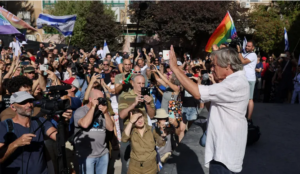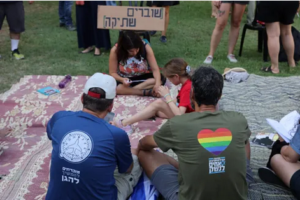Why 230 teenagers could be the Israeli government’s worst nightmare

School principal Zeev Degani speaking to protesters at Gymnasia Herzliya high school in Tel Aviv on 3 September 2023
Dahlia Scheindlin writes in Haaretz on 6 September 2023:
Looking back on 2023, every Israeli will recall the moment when the country’s most powerful missile intercepted the judicial overhaul plans. By late March, three months of civic uprising had provided stunning optics, but desperate citizens had no real leverage against the institutional power of the government’s unstoppable Knesset majority. Then a small subgroup hit upon the most vulnerable spot in Israeli society: the armed forces.
The specter of refusal by highly skilled, hard-to-replace air force and other reservists rattled the top military brass. Warnings of actual damage mounted and finally, on March 25, Defense Minister Yoav Gallant became the first member of the government to call for a halt to the legislation. This sparked 48 hours of havoc that only ended when Prime Minister Benjamin Netanyahu buckled and put the judicial overhaul on hold. The full package of judicial plans has never recovered.
Since late March, the protesters have realized their power to grip the country where it hurts – through military refusal. Up to 10,000 people have indicated they would not report for reserve duty. And the government knows it can get far worse, if refusal spreads from reservists to active-duty conscripts or if mass numbers of youth refuse to be drafted at all.
Against this tense backdrop, a group of Tel Aviv high schoolers held a defiant public event on Sunday announcing their refusal to be drafted. Around 230 students signed a public letter, printed on a large sign installed on the stage in the backyard of the storied Gymnasia Herzliya school in central Tel Aviv.
The event had generated fanfare due to government pressure and the school board opposing hosting the event on its premises. The pressure prompted a beloved longtime principal to announce his resignation, raising hackles among indignant parents. The school ultimately allowed the event in the grassy backyard (after school hours), with the big sign and speeches by the students supporting refusal, and discussion circles led by organizations that partnered for the event, including the anti-occupation Breaking the Silence group featuring former soldiers.
But the government doesn’t seem very worried.
The event was what Israelis call “intimi.” A few hundred people greeted each other like a small circle of friends; I ran into colleagues, a cultural figure, a lawyer, a psychologist and a social psychologist. Parents gushed at their kids’ political engagement, but just as many said they showed up mainly to support the principal or as an issue of free speech.
And while over 200 students took a courageous, even fateful, position of refusing the draft in the right-wing environment of Israeli society, overwhelmingly so among Jews, it’s not a first.
Politically motivated military refusal dates back decades. The Israel Defense Forces represents the institution with the greatest moral and empirical support in Israeli society, but there have always been voices of dissent. In a valuable 2010 compendium of refusal waves – or at least declarations – Assaf Shapira of the Israel Democracy Institute documented a letter from 70 high schoolers in 1970 protesting Israel’s policies in the occupied territories. Letters threatening refusal – either to serve in the occupied territories or to be drafted at all – followed from other groups, in 1971 and 1979. In 1982, small pockets of reservists announced their refusal to serve in Lebanon. During the second intifada (from 2000-2005), there was the 12th graders’ letter, the reserve officers’ letter and the pilots’ letter, all threatening refusal to serve and decrying the occupation. The number of signatories ranged from the dozens to the hundreds. In 2005, refusal seemed poised to spread to the right, when 13,000 soldiers signed a petition warning they might refuse an order to remove Israeli settlers from Gaza during the Disengagement, according to Shapira.

Some attenders at the Gymnasia Herzliya event on 3 September 2022
Each wave of refusal, even declarations, makes headlines in Israel’s hyper-militarized and nationalist political reality. But the ripples rarely spread and the numbers never seem to grow. Could this time be different?
After all, nothing about the current context is quite the same. At the school event, there were angry murmurs about the law the government hopes to pass formalizing army exemptions for large numbers of ultra-Orthodox men. The exemption has existed since the birth of the state, of course, but the idea of anchoring the free pass into law (while not the first such attempt) seems to rip the injustice out of Israel’s repressed subconscious and into the fore of public debate.
Moreover, in the current battleground of democracy, Israelis might be learning that all inequality is created equal. That is to say, inequality of military conscription is as wrong as denying equal rights to LGBTQ Israelis – whose flags are prominent at all democracy demonstrations. And the students argue: “The dictatorship that exists for decades now in the territories is now seeping into Israel and is turning against us. The violent settlers now control the entire state. This trend didn’t start now – it’s inherent to a regime of occupation and Jewish supremacy. It’s just that now, the veil has fallen.” Perhaps the protests will catalyze Israeli intersectionality, or simply highlight the fallacy of calling for democracy while tolerating occupation.
If these changes happen, they will be slow rumbles. Unlike the prominent Brothers in Arms reservists who emerged to oppose the government from a very mainstream, centrist swath of Israeli society, the current refusal letter is grounded in a radical left-wing critique of the occupation; don’t expect their bold stance to spark a flood of draft refusal.
And yet, maybe it’s not a quantitative question but a cracking of the social consensus that matters. Shapira explained in his 2010 analysis that the army has always been seen in Israel as the most genuine fulfillment of citizenship. From the start of statehood, former deputy National Security Adviser Eran Lerman wrote recently, David Ben-Gurion saw the army as “not only a tool of war and deterrence … [it was] the nation’s spirit of solidarity and cohesion.” That explains why few cared about the fact that Palestinian citizens were not drafted. With the exception of the Druze, the silent Israeli consensus held that the institution of national solidarity and citizenship was created for Jews.
With supreme irony, it might be the extreme right-wing government that finally breaks the army in Israel. Some weeks ago at the Saturday night demonstration, my colleague Roy Yellin observed in conversation that the group most likely to resent the army at present is the (pro-government) right. If so, that’s half of Jewish society. The other half views the army as an arm of state power that it can legitimately choose to boycott. Arab and Haredi citizens never truly took part to begin with. Even if sufficient numbers remain to fight the tragic, inevitable next war, morally what’s left of the military social consensus?
The crisis of 2023 has unearthed some of the deepest contradictions underlying Israeli life, as tributaries of the great conflict over democracy. One of the most profound is the fact that since 1948, Israel has never drawn a true boundary between military and civil authority. It’s ironic that the right wing accuses the protest of a “military coup” after reservists helped put the boot on government plans. From the earliest decades when left-wing Mapai and the military were deeply linked, to the revolving door of military figures in politics and military legal figures in Israel’s civilian judiciary, to the inextricable (and incomprehensible) joint military and civilian authority over the occupied territories – in a way, Israel’s social and political history has been a long, de facto military coup.
If young people shift the center of moral authority away from the army to a lifetime of civic engagement, however limited their numbers, they will become the seeds of true democracy.
This article is reproduced in its entirety
